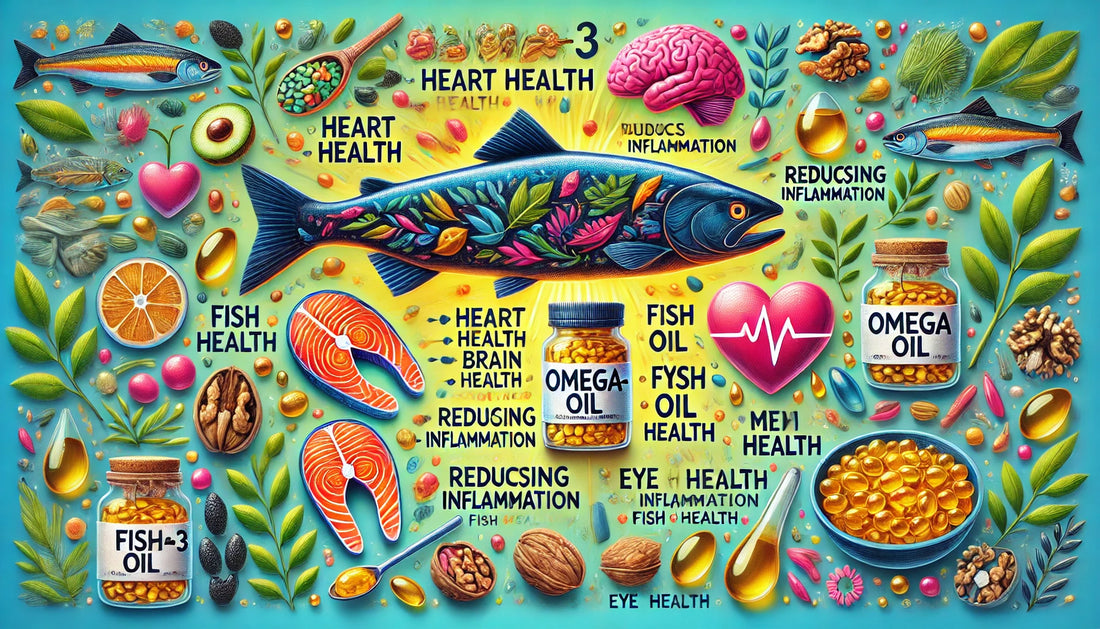
Supplementation: Benefits of Omega-3
Share
Omega-3 is a type of essential fatty acid that plays a vital role in maintaining health and proper functioning of the human body. Found in fatty fish, flaxseeds, walnuts, and fish oil supplements, omega-3 has been widely studied for its health benefits. This article explores the main benefits of omega-3, backed by scientific studies, recommended doses, and main dietary sources.
1. Cardiovascular Health
Benefits:
Omega-3 is known for its cardioprotective properties. Studies show that regular intake of Omega-3 can reduce the risk of cardiovascular disease.
Scientific Evidence:
- 2016 study in the journal "Circulation" : A meta-analysis of 19 studies with over 45,000 participants concluded that omega-3 supplementation is associated with a significant reduction in the risk of heart attacks and sudden cardiac death.
- Research published in the "Journal of the American College of Cardiology" : Showed that Omega-3 consumption is associated with a decrease in triglyceride levels, reduced blood pressure and improved endothelial function.
2. Brain Health
Benefits:
Omega-3 is crucial for brain health, contributing to cognitive function and possibly reducing the risk of neurodegenerative diseases.
Scientific Evidence:
- 2017 study in "Frontiers in Aging Neuroscience" : Indicated that high levels of DHA (a type of Omega-3) are associated with a lower incidence of Alzheimer's and cognitive decline in older adults.
- Research published in the "American Journal of Clinical Nutrition" : Showed that Omega-3 supplementation can improve working memory in healthy young adults.
3. Reduced Inflammation
Benefits:
Omega-3 fatty acids have anti-inflammatory properties that can help reduce chronic inflammation, which is associated with a number of diseases.
Scientific Evidence:
- 2018 study in the "Journal of Nutrition" : Found that omega-3 supplementation resulted in a significant reduction in inflammatory markers in patients with rheumatoid arthritis.
- Research in the "American Journal of Clinical Nutrition" : Showed that Omega-3 can reduce inflammation in patients with inflammatory bowel disease.
4. Eye Health
Benefits:
DHA, a type of omega-3, is an important structural component of the retina. DHA deficiency can cause vision problems.
Scientific Evidence:
- 2016 study in "Investigative Ophthalmology & Visual Science" : Found that adequate omega-3 intake may reduce the risk of age-related macular degeneration (AMD).
- Research published in the "Journal of Ophthalmology" : Suggested that omega-3 supplementation may alleviate symptoms of dry eye syndrome.
5. Mental Health
Benefits:
Omega-3 has been linked to improved mental health, including reduced symptoms of depression and anxiety.
Scientific Evidence:
- 2019 study in "Translational Psychiatry" : Indicated that EPA (a type of Omega-3) supplementation may be effective in treating major depression.
- Research in the "Journal of Clinical Psychiatry" : Concluded that Omega-3 can help reduce symptoms of anxiety in people with a clinical diagnosis.
Recommended Doses of Omega-3
Recommended omega-3 doses may vary depending on individual needs and health goals. However, here are some general guidelines:
- For healthy adults : The American Heart Association recommends consuming at least 500 mg of combined EPA and DHA per day from two servings of fatty fish per week.
- For lowering triglyceride levels : Dosage may be increased to 2-4 grams of combined EPA and DHA per day under medical supervision.
- For mental health : Studies suggest that doses of 1-2 grams of EPA per day may be beneficial for reducing symptoms of depression.
Main Food Sources of Omega-3
Fatty Fish:
- Salmon
- Mackerel
- Sardine
- Herring
- Tuna
Plant Sources:
- Flax seeds
- Chia
- Nuts
- Canola oil
- Soybean oil
Supplements:
- Fish oil
- Krill oil
- Algae oil (for vegetarians and vegans)
Where to buy
Conclusion
Omega-3 supplementation offers a wide range of health benefits, from improving cardiovascular and brain health to reducing inflammation and promoting eye and mental health. To maximize these benefits, it is recommended to include rich sources of omega-3 in your diet, such as fatty fish, flaxseeds, walnuts, and consider supplementing with fish oil or other forms of omega-3.
References:
- Circulation. 2016;133(24)
- J Am Coll Cardiol. 2015;66(24):2727-2738.
- Front Aging Neurosci. 2017;9:206.
- Am J Clin Nutr. 2012;95(3):530-536.
- J Nutr. 2018;148(11):1631-1636.
- Am J Clin Nutr. 2014;99(6):1238-1246.
- Invest Ophthalmol Vis Sci. 2016;57(8):3756-3762.
- J Ophthalmol. 2015;2015:403836.
- Transl Psychiatry. 2019;9(1):224.
- J Clin Psychiatry. 2018;79(3):17r12046.
What is the right training program for me?
We recommend that you check which training program is best suited for you. Find out which training program is right for you where after completing the questionnaire we will help you identify the ideal training plan based on your goals and fitness level, ensuring more efficient and targeted development.
Revenues:
- Chicken Salad with Quinoa and Avocado
- Recipe: Protein Pancakes
- Chicken Salad with Quinoa and Avocado
- Recipe: Banana Smoothie with Rice and Oat Milk
- Green Detox Smoothie Recipe
Other topics:
Challenge of the day | Tips | Training
Suggested services:
Diagnosis, assessment/reassessment | Planning | Accompanied training
Suggested ebooks:
100 No Excuses Workouts | Amateur race | Fitness Detox
Suggested training programs:
Military training | Metabolic training
Where to buy Food Supplements
Whey protein 900g chocolate flavorCreatine monohydrate with Creapure® seal 240 capsules
Omega-3 Supplement
Visit Home Training for more tips and guidance on how to improve your health and longevity through healthy living practices.



